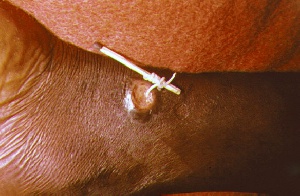Tamale, Oct. 26, GNA - The government is committing 9.5 billion cedis this year towards the eradication of the guinea worm disease in endemic districts of the country.
Mr. Abraham Odoom, Deputy Minister of Local Government, Rural Development and Environment announced this in Tamale on Wednesday. He said 5.5 billion cedis under the Northern Region Poverty Reduction Programme (NORPREP), would be used to provide 62 boreholes at Yendi, Tolon-Kumbungu and Savelugu-Nanton Districts.
He said the additional four billion cedis would however be sourced from the Ministry of Finance and Economic Planning under a Special Guinea worm Eradication Fund to provide potable water to the other endemic districts.
He noted that fighting a scourge such as the guinea worm disease needed adequate funding and gave the assurance that an additional budgetary allocation would be made to provide more water facilities and other services for the rest of the endemic districts in the country. Mr. Odoom was addressing personnel of the Ministries of Health, Local Government, Rural Development and Environment; District Chief Executives and Coordinating Directors, as well as sanitation related NGOs at a Northern Region Sanitation Forum.
The Ministries of Local Government, Rural Development and Environment and Health, as well as the Community Water and Sanitation Agency (CWSA) organised the forum with sponsorship from the Carter Centre, an American NGO.
The forum looked at the status of sanitation in Northern Region and Ghana, the Ministry of Local Government's strategy for interfacing with districts, current views of latrine standards and attempt to resolve the standard differences.
Mr. Odoom announced that the government had planned to increase the District Assemblies' Common Fund from the current five per cent of national revenue to seven per cent to accelerate district level development, especially in the areas of water provision and sanitation facilities.
He said the government was doing this mindful of the negative impact that poor water supply and sanitation would have on the successful implementation of the National Health Insurance Scheme (NHIS).
The government was therefore focusing its attention on environmental sanitation, revenue mobilisation and promotion of decentralisation.
Mr. Odoom said it was for this reason that the sector Ministry had elevated the Environmental Health and Sanitation Unit to play its expected role of policy formulation, coordinating, monitoring and evaluation, at the Ministry, as well as ensuring effective supervision and monitoring at the regional and district levels.
He announced that the Ministry was collaborating with the private sector, bilateral and multilateral donor agencies, local and international NGOs to revise the Environmental Sanitation Policy. "The ultimate goal of these interventions was to reduce poverty, enhance quality of life and bring about rapid socio-economic, development in the rural communities," he said.
Mr. Odoom commended UNICEF, Danish International Development Agency (DANIDA), the Carter Centre, European Union, Canadian International Development Agency (CIDA) and the Catholic Relief Service (CRS) for helping to provide adequate water and sanitation facilities to the people in the Northern Region. He appealed to these organisations to sustain the pace for the realization of quality life and improved socio-economic development in the country.
General News of Thursday, 26 October 2006
Source: GNA













